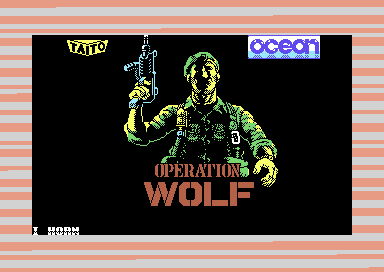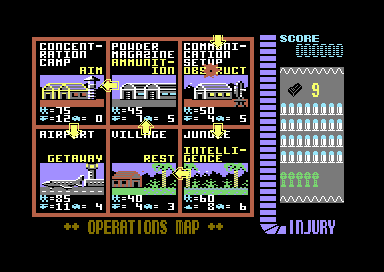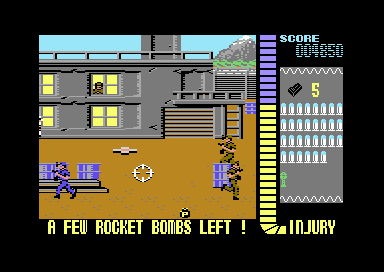Operation Wolf (Hit Squad, 1988)
Bringing my first arcade obssession home.
05 Sep 2021 | by njmcode | 9 min
- Genre:
- Shooting | Action
- Format:
- Cassette
- Developer:
- Ocean
- Composer:
- Jonathan Dunn
- Publisher:
- Hit Squad
- Released:
- 1988
- Tags:
- arcade-port | single-player
Memory
The original Operation Wolf is perhaps my earliest clear memory of The Arcade.
The specifics of my first play are fragmented and blurred in the mists of my childhood: possibly some motorway services during a family holiday, or the bustling corner of a seaside arcade on a day trip; that mingled smell of popcorn, cigarrettes and cleaning fluid. Whatever the origin, Taito's 1987 shooter, with its iconic replica Uzi 9mm gun controller, fundamentally changed my youthful idea of 'fun'.
Operation Wolf saw you attempt a hostage rescue mission in a generic banana republic setting obviously inspired by the Rambo: First Blood Part II and Commando movies of the time.[1] The game scrolled horizontally in first-person across six stages, each with a set number of enemy troops and vehicles to destroy in order to progress. Enemies injured the player with return fire if not swiftly dispatched, making the game a test of reflexes and target prioritisation, while a limited supply of ammunition and rockets required a true aim and a reliance on in-field replenishment from powerups. The final two stages also involved protecting the hostages as they escaped confinement and boarded a plane to freedom.
I was instantly fascinated and perplexed by the game's dramatic graphics, sonics, tone, and overall menace. It even spoke, its bassy, bit-crushed American tones narrating your one-man war. Everywhere I found a cabinet, I would nag my folks until I got a coin to play. At home, I would draw the moody title screen from memory, or craft a paper Uzi and mow down imaginary 'bad guys', machine-gun sounds spewing from my mouth.[2] Operation Wolf dwarfed everything else I had at my disposal for entertainment, from toy guns to action figures to handheld electronic games to my Atari 2600, and I was a kid hooked on its gung-ho militarism, eagerly awaiting the next distant trip to an arcade.

Of course, I absolutely sucked at it. A boy of seven or eight spraying bullets around, in a game where ammo conservation is vital? Every time, the Uzi would sputter dry, my haggard-looking protagonist soon dismissed to a prison cell alongside the very hostages he was sent to rescue. An ignominious end for sure, but it did nothing to dampen my enthusiasm for my next play.
During one such attempt, I tried to do better. I picked my shots, saving my bullets. It wasn't enough; the relentless attack of the enemy brought my mission to yet another swift end. But what I saw was not the 'taken hostage' screen I had grown sadly accustomed to. No, for losing while still able to defend myself, I was rewarded accordingly: a stark, looming image of my protagonist, keeling over as enemy fire tore up the reddened scenery behind him. His face a twisted mask of pain, his hand reached out towards me, as that booming voice delcared that 'YOU HAVE SUSTAINED A LETHAL INJURY.' In that moment, some small fragment of horror welled up inside my young self, and I averted my eyes, genuinely terrified - almost traumatised.[3]
After that, I avoided the game in arcades for a good while, though it haunted my daydreams and nightmares. When I was drawn back to playing it, I would duck my head upon losing, avoiding the sight of that screen. Even watching other people play, I would flee at the moment of their defeat. There I was, desperate to play my favourite game, and desperately afraid to do so.
It was with these fears still uppermost in mind that I finally obtained the Commodore 64 version of Operation Wolf sometime in my pre-teens.
Even the tape loader sensed my apprehension, quickly declaring IT'S THE WULF [sic] ominously. I didn't know what to expect, but I was indeed afraid. I distracted myself by 'listening' to the loader - I had discovered early in my C64 journey that if the TV volume was nearly at maximum, I could hear the data noise in a similar way to a Spectrum.[4] Leaning in towards the TV, mesmerised as always by the inscrutable yet hypnotic screeches of the game slowly filling my C64's memory, I was completely unprepared for the sweeping, blaring synth shriek that erupted from the speaker, mere inches from my ear. I jumped back, my already-primed heart in my throat, and fumbled to retain control of the volume as a snare drum kicked in. A beat established itself as I tried to slow my breathing. The full might of the SID chip blazed into life as the loader revealed the unmistakeable title screen of Operation Wolf, right there on my own TV.[5] And so began my first contact with 'Ocean Loader 5', one of the most famous tunes in the history of the machine, and one that is understandably burned into my brain to this very day.[6]
By the time the game had loaded, I was already having A Moment with my beloved C64, convinced that what I was about to play would be the greatest thing ever - the arcade machine in my home, essentially, as promised by so many back-of-the-box quotes of the time. I even held out some magical hope that the game would be compatible with my light gun, despite the instructions explicitly noting the joystick/mouse only controls. After all, the Spectrum version, which I had played often at my cousin's house, had light gun support, right? It was as though the C64 game would miraculously unlock the feature if I just wanted it enough. Alas, it wasn't to be, and after fruitlessly plugging my Cheetah gun in and pressing the trigger a bunch of times, I defeatedly set about playing with my trusty Atari joystick instead.[7]

As with the original, the game's stages scrolled by as troops, tanks and choppers assaulted me from the screen. Without light gun support, the game offered a targeting reticule to aim my bullets, with the Space bar launching an explosive. The game's music and graphics offered a decently hard-edged, if obviously simplified, version of the arcade experience, but I initially struggled with the controls. As my injury meter creept ever-closer to oblivion, pinging a warning alarm, I was sweating. Would the game somehow feature the death screen I so deeply feared? Somewhat thankfully, the version I played had no intermission graphics of any kind, so I was spared yet more emotional damage.[8]
Once my feelings of hype and apprehension had subsided, C64 Operation Wolf turned out to be a simple but very enjoyable experience. The screen-filling sprites, voice samples and visual flair of the original were absent, though enemies still moved on multiple planes, with large(r) attackers still occasionally appearing in your face. In fact, despite the obvious cutbacks in fidelity and content, including the omission of some enemies, mini-bosses and other stage-specific quirks, the game retained the core of the arcade experience. Tanks rumbled by, choppers buzzed overhead, gunboats attacked from the river, and even the knife-wielding assassins menacing the hostages were included. The powerups, including replacement ammo, health potions, and more outlandish ones like a 'free fire' ability and screen-clearing dynamite bundles, were all present and correct, as were the hapless civillians and medical personnel running around this active war zone - another reason to check one's aim.
C64 Operation Wolf became a fixture of my regular play time. The original's core gameplay, rhythm and broad aesthetics were definitely still there, and just as compelling - perhaps more so, since now I could focus on mastering the game without the bombastic distractions of the coin-op. The formula, even distilled down to fit my 8-bit machine, remained potent. Finding myself down to a single mag, no explosives, the injury warning alarm ringing in my ears as I desperately tried to out-gun the remaining few enemies of the stage, was a sweaty-palmed and heart-pounding experience. I eventually got pretty good at the game, even with joystick control, and was able to finally complete it, escaping this unnamed hostile country as a hero with rescued hostages in tow. It would not be my last experience with Operation Wolf or its progeny on my Commodore, but that is a story for another time.
Analysis
The verbosity of the above section hopefully reflects the impact this game, in both its original and C64 forms, had on my childhood. It ushered in a new, adult-feeling and dangerous era for my perception of what 'games' could be, and has continued to fascinate me ever since. In the 2000s when I discovered MAME and the nostalgic potential of emulation, you can easily guess what the first game I played was.
The concept of a 'gallery shooter', or even that of a gun-shaped controller, was nothing new in 1987, with rifle and pistol-based entertainment predating even electro-mechanical arcade games by many decades.[9] Operation Wolf brought together a realistic automatic weapon controller, contemporary combat aesthetics, 'human' enemies that fought back, and cutting-edge arcade sensibilities. Its side-scrolling, on-rails movement and kill-or-be-killed gameplay was straightforward, with only minor nuances in strategy, but it formed the basis of the 'military shooter' industry as we know it today, and was a revelatory experience in a genre previously dominated by target-shooting and carnival games.[10] Many sequels and imitators followed, but the original always held a special prestige for me.
The C64 conversion was, in hindsight, about as good gameplay-wise as could have been reasonably expected. I'm sure I wasn't alone in hoping, often in the face of overwhelming evidence to the contrary, for magical outcomes from home conversions as a child. My understanding of system requirements and limitations didn't really stretch beyond what I could imagine, never mind see and hear, which when coupled with the industry's nasty habit of adorning their game boxes with screenshots from superior systems, led my all-too-willing young mind to dream impossibly big. C64 Operation Wolf was a valuable lesson in tempering expectations and appreciating gameplay over spectacle, but one that I would need to re-learn often, as publishers brazenly continued to push more and more ambitious conversions onto the old beige box right up to the end of its commercial lifespan.[11]

The famed Ocean loader theme remains an indelible part of my wider C64 memories, and though it would show up on many other games (succeeding its many previous versions), I always associated it with Operation Wolf the most. Its C-minor badassery and technical wizardry felt more weighted and powerful than anything on the game's otherwise-decent soundtrack. Waiting for the game became its own reward - exactly the purpose of a loading routine, after all.
Some time after the original C64 release, I did get my hands on a light gun-compatible version of Operation Wolf, included in a Trojan Light Phaser bundle that otherwise contained the very types of target-based gallery shooter that the 1987 arcade game overshadowed in its heyday. Finally getting to play the C64 version with a gun was a heady experience, but the content otherwise remained unchanged. I do wonder if present-day C64 wizards could squeeze a more faithful rendition of the original onto the machine, perhaps with the aid of a modern cartridge format, and bring the experience ever-closer to my vivid memories of the 80s arcade.[12]
Other 'gun game' arcade conversions appeared on the machine later, including the official sequel Operation Thunderbolt and the Aliens-influenced Space Gun - both aesthetically-rich, and even supporting the light gun in the case of Thunderbolt, but stunted by heavy multiload, weak gunplay, and their doomed attempts to replicate cutting-edge arcade sprite-scaler technology on the overmatched C64. They inherited little of the tension or replayability of their ancestor. In terms of simple, addictive gameplay steeped in formative memories - with a dash of childhood trauma thrown in - Operation Wolf remains a landmark title in my personal gaming history, from the arcade to the home.
njmcode